Chewing, Biting & Screaming Oh My!
While it is true that the Blue and Gold Macaw is one of the friendliest companion birds and also among one of the most intelligent, they are not without a few behavior problems.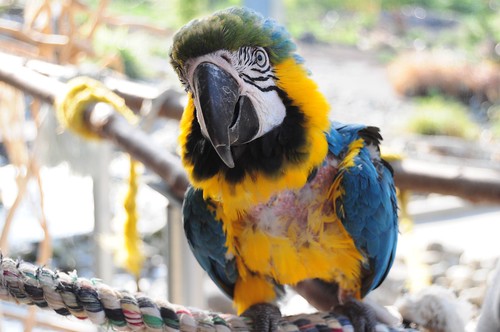

They are intelligent birds and can learn 15-20 words and like to chatter. All this talking and chattering means, at least in the Macaw family, that they’re loud birds.
In addition to having a tendency to be loud, they can also scream when they’re unhappy. That being said even the happiest of birds will still be noisy. They are not the right bird for you if you live in an apartment or a condominium with shared walls.
The more common behavior problem that Blue and Gold’s exhibit is biting. They have large powerful beaks and they love to chew.
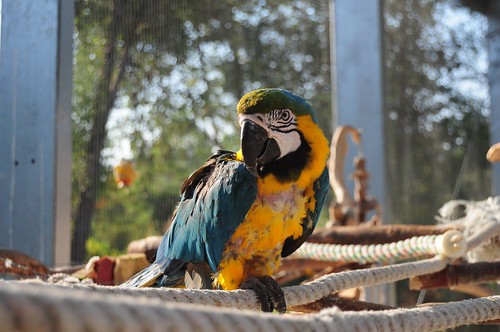 As a young bird this may start out as exploring. If you react to their beak on your hand with a shriek, they think “oh cool, I got a reaction.
As a young bird this may start out as exploring. If you react to their beak on your hand with a shriek, they think “oh cool, I got a reaction.
Let’s see what happens if I do it again.” They bite you, you react and you are literally training them to bite you – probably not what you had in mind. Biting, to a certain degree, is normal behavior for a Macaw especially when they’re reaching maturity but they don’t have to bite you.
Through training, you can redirect their tendency to chew to toys. They’re incredibly intelligent and can be trained out of biting habits pretty easily. They’re very communicative birds and will express themselves physically. This tendency to communicate with their bodies makes it easier for you to tell when they’re getting upset.
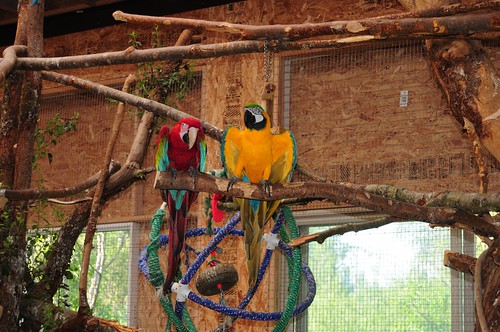 Not all macaws show the same behaviors, however it is common to see them fluffing their feathers or raising their wings. If your Macaw normally shows this behavior right before he tries to take a bite out of your hand, you are one step ahead of him and can avoid a potential aggressive encounter.
Not all macaws show the same behaviors, however it is common to see them fluffing their feathers or raising their wings. If your Macaw normally shows this behavior right before he tries to take a bite out of your hand, you are one step ahead of him and can avoid a potential aggressive encounter.
They’re also incredible chewers and if you leave them alone in your home, you will come home to find things destroyed. Make sure you don’t leave your Blue and Gold Macaw alone. Make sure you also give them plenty of appropriate things to chew on and redirect them to the ‘appropriate’ chew toys when you find them chewing on furniture.
The last problem you might encounter with a Blue and Gold Macaw is feather plucking. They’re generally not prone to this behavior because they adapt well and are social animals. If your beloved macaw begins to pull their feathers out, take them to your avian veterinarian first to make sure they’re healthy.
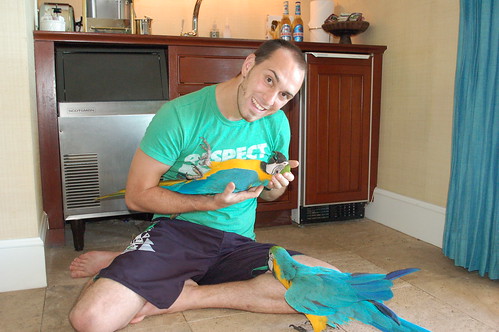 Once any medical issue has been ruled out, take a look at their environment. Feather plucking is almost always caused by stress. Make certain they have an optimal cage environment, get plenty of sleep, have a balanced diet, and get to spend several hours a day out of their cage interacting with the family. A sturdy perch placed in your home is a perfect out of the cage solution.
Once any medical issue has been ruled out, take a look at their environment. Feather plucking is almost always caused by stress. Make certain they have an optimal cage environment, get plenty of sleep, have a balanced diet, and get to spend several hours a day out of their cage interacting with the family. A sturdy perch placed in your home is a perfect out of the cage solution.
Spending time with your Blue and Gold goes a long way toward a happy and healthy bird. When you’re hanging out with your bird, take a few minutes every day to train them. The Blue and Gold Macaw is an intelligent bird and can learn a few words as well as many tricks. Training isn’t just for tricks, training socializes your Macaw to be comfortable in any situation.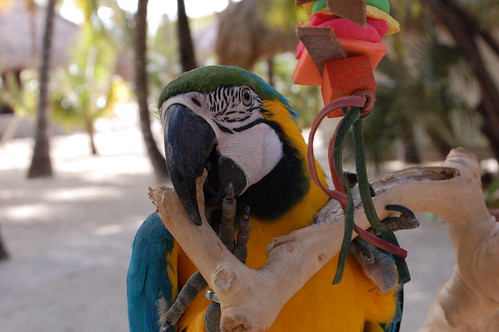

It teaches them to problem solve. It helps to establish a strong bond of trust, a lack of trust is often a common cause of behavior problems. Training your Blue and Gold macaw will help eliminate behavior problems, establish you as the boss, and teach your macaw the rules.
In general, the Blue and Gold Macaw is an extremely social, adaptable, and intelligent bird that is well suited for family life. They can be prone to aggressive behaviors or a quick change in mood. Early and continued training and proper care will help to eliminate any behavior issues.
http://budgerigarunivers.blogspot.com/
http://budgerigarunivers.blogspot.com/
No comments:
Post a Comment